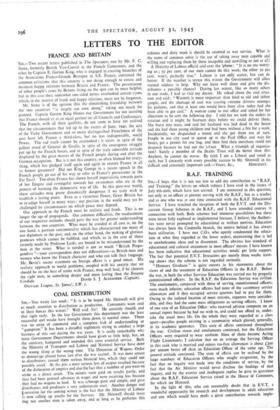LETTERS TO THE EDITOR
FRANCE AND BRITAIN 'SIR,—Two recent letters published in The Spectator, one by Mr. F. C. Stone, formerly British Vice-Consul in the French Cameroons, and the
other by Captain E. Garton King, who is engaged in creating branches of the Association France-Grande Bretagne in S.E. France, contained the common criticisms that this country is not doing enough to create and maintain happy relations between Britain and France. The presentation of other people's cases by Britons living on the spot can be most helpful, but in this case their somewhat one-sided letters overlooked certain issues which, in the interest of frank and happy relations, must not be forgotten.
Mr. Stone is of the opinion that the diminishing friendship between the two countries "is largely our own doing," taking too much for granted. Captain Garton King blames our Government for not insisting
that France should sit as an equal partner on all Councils and Conferences. The French, with all their qualities, do not seem to have yet realised
that the circumstances that led up to the events of June, 1940, the acts of the Vichy Government and so many distinguished Frenchmen of the past have left France a third-class, but no less indispensable, world Power. The sad truth cannot be overlooked ; it exists in spite of the gallant stand of General de Gaulle, in spite of the courageous struggle put up by the French forces, and in spite of the truly admirable attitude displayed by the great masses of the French people during and after the German occupation. But is it not this country, so often blamed for every- thing, which has pledged itself again and again to restore France in all its former greatness? Did not King George in a recent speech to the French people go out of his way to refer to France's possessions in the Far East? Too often France has shown herself imperialistic towards parts of her Empire and revengeful towards her ex-enemies who are in the process of learning the democratic way of life. In this post-war world, these attitudes may prove dynamically dangerous if we truly wish to establish a lasting peace. Even as a victorious Power, Great Britain has to re-adapt herself in many ways: our position in the world may yet be challenged by circumstances on which peace may depend. Our approach to the French must be realistic and frank. This is no longer the age of propaganda. Our common difficulties, the readjustment of our respective outlooks should pave the way for greater understanding between the two countries. What must be avoided at all cost is, on the one hand, a partisan sentimentality which has characterised too many of our diplomats in the past, and, on the other hand, the making of glorious promises which cannot be fulfilled, and which, as in the case of those recently made by Professor Laski, are bound to be misunderstood by the man in the street. What is needed is not so muc,h " British Propa- gandists "—your correspondent does not differentiate—as British men and women who know the French character and who can talk their language. Mr. Bevin's recent statement on foreign affairs is a good omen. His realistic approach to world problems, coupled with his anxiety that we should be on the best of terms with France, may well lead, if he chooses the right men, to something deeper and more lasting than the Entente


























 Previous page
Previous page